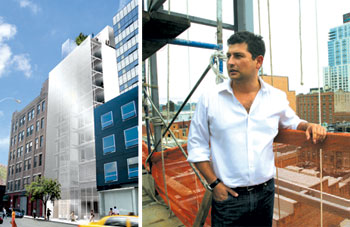
A rendering of the Habita Hotel and Sean Ludwick of Black House Development at the construction siteWhen the first credit card is swiped at the new High Line Habita Hotel in Chelsea, it will be another feather in the cap of two young developers who appear to be defying market conventions.
In the span of 12 months — during a period that historians are unlikely to look back upon as one of excessive achievement — Sean Ludwick and his partner, Ashwin Verna of the Manhattan-based Black House Development Corporation, will have launched two new projects in New York City.
The first is Garfield Sparta, a 17-unit condo building at 580 Carroll Street in Park Slope; sales started in late March. The second is their new 56-room hotel, which is under construction and nearly complete, on 27th Street and 10th Avenue.
Both boast designs by the renowned Mexican architect Enrique Norten. In addition, the two partners have a third Norten-designed hotel project in the works.
The High Line Habita is scheduled for a “soft” opening (for friends and family) sometime around Christmas, and an official launch when the second phase of the High Line opens next spring. The hotel will include 49 junior suites priced at $350 a night, and seven king suites priced between $450 and $500 per night.
The 10-story façade will be veiled by a mesh metal netting, and vertically sliced by an exterior service elevator that will light up. It will also include a bar, grill, basement lounge and small pool on the roof, with vistas of the Hudson and the High Line. There are also plans for a French-style brasserie.
But getting the project to this point hasn’t been easy, as any developer who’s had a project stall will tell you.
“We’ve seen so many powerful people taken down so quickly,” said Ludwick, during an interview with The Real Deal last month. “You just don’t want the gods to get upset with you.”
Ludwick — a 37-year-old former banker at Salomon Smith Barney and Deutsche Bank who has familial ties to the Spanish, Mexican and South American financing and design communities — said he is enthused about bringing Latin-design elements to both Manhattan and Brooklyn in the two new projects. This is the first Habita Hotel, a Mexican brand of boutique hotels, in the United States.
The Habita, which despite its starchitect designer hasn’t received much media attention to date, is the smallest hotel (in terms of number of rooms) scheduled to open in Manhattan in the next year.
What’s more, it’s opening into a tricky hotel environment.
As The Real Deal has reported, Manhattan will see a burst in the number of new hotel rooms over the next eight months, creating competition for Habita right out of the gate. Also, according to Colliers PKF Consulting, Habita’s room rates are above the Manhattan-wide average of $252 per night that was registered in the month of May.
But the rocky hotel market that Manhattan experienced during the recession has recently rebounded. Occupancy was at 80 percent in May, and is likely to continue climbing through the fall, according to PKF. John Fox, senior vice president at PKF, said the timing for a small boutique hotel like Habita may be ideal.
“It is a case-by-case, corner-by-corner business. Some of the smaller and non-chain facilities fell further than the chain-affiliated ones. And so in the recovery, they are recovering faster, because they fell so far,” said Fox.
Ludwick said he’s confident about filling rooms at the hotel.
“People want to be [in Manhattan],” he said. “It is the Disney World for adults. In the long term, if you bring a fresh idea, we feel comfortable with the supply-and-demand dynamics,” he said.
He said one of the reasons the project has made it this far, and not stalled-out like a number of other developments in the city have, is because of its solid financing structure.
Ludwick said he eschewed any complicated structural financing for both Garfield Sparta and Habita and seems openly disdainful of financing methods that include mezzanine loans. Instead, he opted for a traditional loan from a Chinese bank, which is supported by the four partners involved: Ludwick, Verna, Norten and an unnamed Mexican investor.
To date, the High Line park itself has had more than 2 million visitors and spurred a number of new businesses. While a spokesperson for the organization Friends of the High Line said it was too early to measure the exact economic impact the park has had on new businesses, there have been plenty of new condos and hotels. These include the Standard Hotel, which opened in January 2009 and is seemingly doing well.
At 580 Carroll, meanwhile, sales have been brisk, with 5 of 17 units in contract in just seven weeks of sales.
That comes after a rocky start that included dust-ups with the community, which resulted in scaling back the project’s plans. Indeed, a lost zoning variance meant that the developer could not construct three townhouses on Carroll Street, which Ludwick admitted affected the financial scalability of the project.
Other than his monogrammed shirt, terms like “financial scalability” are one of the few obvious vestiges of Ludwick’s former banker life. (He more often uses phrases like “ethos” and “fluidity of energy” when describing his projects.) Also, he seems to sense his good fortune in getting two projects off the ground in this climate, despite the difficult work that awaits.
And, it appears that the developers are teaming up with Norten again for at least a couple more projects.
“We’re in the process of raising financing for a second hotel project downtown, near the Bowery, as well as residential development opportunities in Manhattan and Brooklyn,” Ludwick said.